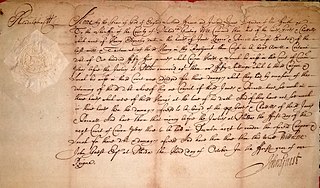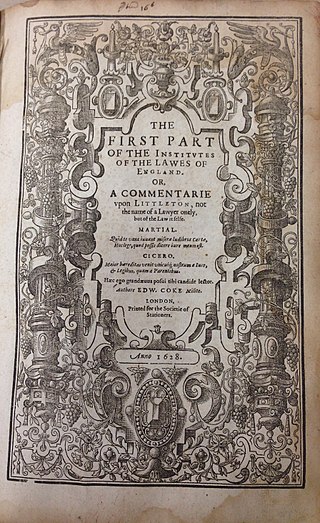In ordinary language, a crime is an unlawful act punishable by a state or other authority. The term crime does not, in modern criminal law, have any simple and universally accepted definition, though statutory definitions have been provided for certain purposes. The most popular view is that crime is a category created by law; in other words, something is a crime if declared as such by the relevant and applicable law. One proposed definition is that a crime or offence is an act harmful not only to some individual but also to a community, society, or the state. Such acts are forbidden and punishable by law.

In common law, a writ is a formal written order issued by a body with administrative or judicial jurisdiction; in modern usage, this body is generally a court. Warrants, prerogative writs, subpoenas, and certiorari are common types of writ, but many forms exist and have existed.

Robert Green Ingersoll, nicknamed "the Great Agnostic", was an American lawyer, writer, and orator during the Golden Age of Free Thought, who campaigned in defense of agnosticism.
Halsbury's Laws of England is a uniquely comprehensive encyclopaedia of law, and provides the only complete narrative statement of law in England and Wales. It has an alphabetised title scheme covering all areas of law, drawing on authorities including Acts of Parliament of the United Kingdom, Measures of the Welsh Assembly, UK case law and European law. It is written by or in consultation with experts in the relevant field.

Case citation is a system used by legal professionals to identify past court case decisions, either in series of books called reporters or law reports, or in a neutral style that identifies a decision regardless of where it is reported. Case citations are formatted differently in different jurisdictions, but generally contain the same key information.
Documentary evidence is any evidence that is, or can be, introduced at a trial in the form of documents, as distinguished from oral testimony. Documentary evidence is most widely understood to refer to writings on paper, but the term can also apply to any media by which information can be preserved, such as photographs; a medium that needs a mechanical device to be viewed, such as a tape recording or film; and a printed form of digital evidence, such as emails or spreadsheets.

Thomas McIntyre Cooley was the 25th Justice and a Chief Justice of the Michigan Supreme Court, between 1864 and 1885. Born in Attica, New York, he was father to Charles Cooley, a distinguished American sociologist. He was a charter member and first chairman of the Interstate Commerce Commission (1887).

The Institutes of the Lawes of England are a series of legal treatises written by Sir Edward Coke. They were first published, in stages, between 1628 and 1644. Widely recognized as a foundational document of the common law, they have been cited in over 70 cases decided by the Supreme Court of the United States, including several landmark cases. For example, in Roe v. Wade (1973), Coke's Institutes are cited as evidence that under old English common law, an abortion performed before quickening was not an indictable offence. In the much earlier case of United States v. E. C. Knight Co. (1895), Coke's Institutes are quoted at some length for their definition of monopolies. The Institutes's various reprinted editions well into the 19th century is a clear indication of the long lasting value placed on this work throughout especially the 18th century in Britain and Europe. It has also been associated through the years with high literary connections. For example, David Hume in 1764 requested it from the bookseller Andrew Millar in a cheap format for a French friend.
A Treatise of Pleas of the Crown; or, a system of the principal matters relating to that subject, digested under proper heads is an influential treatise on the criminal law of England, written by William Hawkins, serjeant-at-law, and later edited by John Curwood, barrister. It was first published in 1716 and went through eight editions, the last of which was published in 1824.

The Act 7 Will 4 & 1 Vict c 85, sometimes called the Offences against the Person Act 1837, was an Act of the Parliament of the United Kingdom of Great Britain and Ireland. It amended the law relating to offences against the person. It was one of the Acts for the Mitigation of the Criminal Law passed during the session 7 Will 4 & 1 Vict. The Legal Observer said that this Act materially lessened the severity of the punishment of offences against the person.

The Forgery Act 1830 was an Act of the Parliament of the United Kingdom. It consolidated into one Act all legislation imposing the death penalty for forgery. Two years later the death penalty was abolished for most of these offences, and for the remaining offences in 1837.
A New Abridgment of the Law is a legal book compiled by Mathew Bacon. The first edition dates from 1736, and the most recent English edition in 1832.
Commentaries on American Law is a four-volume book by James Kent. It was adapted from his lectures at Columbia Law School starting in 1794. It was first published in 1826 by O. Halsted and has been reprinted and revised many times since. A twelfth edition was edited by Oliver Wendell Holmes, Jr. A fourteenth edition edited by John M. Gould was published in 1896, and a fifteenth edition edited by Jon Roland was published 1997-2002.
Ascuns novel cases de le ans et temps le Roy H. VIII., Edv. VI, and la Roygne Mary. Escrie ex la graund Abridgment, compose per Sir Robert Brooke, Chivaler, &c., la, disperse en les Titles; mes icy collect sub ans is the title of a collection of law reports, compiled by Richard Bellewe, of cases decided between approximately 1515 and 1558. They are reprinted in volume 73 of the English Reports.
This list is a legal bibliography.
Anthony Hammond (1758–1838) was an English barrister and legal writer, known as a legal reformer. His reform proposals for legal codification, influenced by Jeremy Bentham but also by Robert Malthus, went further than was acceptable at the time.
John Frederick Archbold (1785–1870) was a barrister and legal writer. He was the first editor of the English criminal law textbook Archbold Criminal Pleading, Evidence and Practice, which is still routinely used in court today.
Cox's Criminal Cases are a series of law reports of cases decided from 1843 to 26 June 1941.
A Treatise on Crimes and Misdemeanours or Russell on Crime is a book originally written by William Oldnall Russell. For the purpose of citation, its name may be abbreviated to Russ Cr.
Certain former courts of England and Wales have been abolished or merged into or with other courts, and certain other courts of England and Wales have fallen into disuse.







